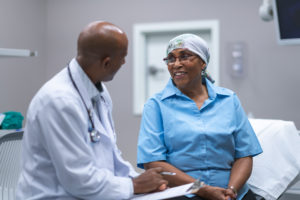
About 1 in 8 American women will develop breast cancer. In addition to breast exams, and mammograms, some women and men with a family history of breast cancer may also need to get a genetic screening. About 5 to 10% of breast cancers are linked to genetic mutations.
There are many inherited genetic mutations that can increase the likelihood of breast cancer. Two of the most well-known genes are breast cancer gene 1 (BRCA-1) and breast cancer gene 2 (BRCA-2). These genes greatly increase the risk of breast and ovarian cancer.
What are BRCA-1 and BRCA-2?
BRCA-1 and BRCA-2 are tumor suppressor genes. These genes produce tumor suppressor proteins that help repair damaged DNA. When these genes are mutated, they may not be able to perform their normal function which can lead to abnormal cell growth.
What Cancers are Linked to Mutations in BRCA-1 & BRCA-2?
The most common cancers strongly associated with these mutations are breast and ovarian cancer. Anyone with these genetic mutations has a markedly increased risk of developing breast and ovarian cancer.
For instance, in the general population, a woman has a 12% chance of developing breast cancer. However, an individual with a BRCA-1 mutation has a 70% chance of developing breast cancer. Other cancers associated with BRCA mutations include fallopian tube and pancreatic cancer.
Are Genetic Tests Available to Detect BRCA mutations?
Yes, there are several types of tests that require a sample of blood or saliva which contains DNA. The samples are sent to a laboratory for analysis which could take several weeks for a result. Your doctor will call you to discuss the results.
Who Should Consider Testing for BRCA Genetic Mutations?
In the general population, genetic mutations in the BRCA genes are rare. Therefore your personal and family history should be evaluated by a doctor in order to determine what genetic tests are needed. Some factors that may prompt the need for genetic testing include breast cancer before the age of 50, bilateral breast cancer, breast and ovarian cancer in the same family, multiple individuals with breast cancer in a family, and male breast cancer.
If My Test is Positive for a Mutation What Do I Do?
If you do receive a positive result your clinician will refer you to receive counseling and explanation of what the results mean. The results don’t mean you have cancer but your risk is increased and your options for managing cancer risk will be discussed. Options include enhanced cancer screening, prophylactic surgery, and chemoprevention
The most important thing is to get regular check-ups and follow recommended screening for breast cancer which includes mammograms and inform your physician of any changes in your family history.
Keisha Davis M.D. is a triple board-certified pathologist with the American Board of Pathology. As an unconventional pathologist, Dr. Davis has set herself as an outgoing diagnostician who wants both patients and clinicians to understand more about the practice of pathology and how diseases are diagnosed. She founded AskPath, LLCtodo just that. In her free time, Dr. Davis teaches West African dance and group fitness and enjoys spending time with her family.
References
Breast Cancer. https://www.mayoclinic.org/diseases-conditions/breast-cancer/symptoms-causes/syc-20352470. Oct. 2019.
BRCA Mutations. https://www.cancer.gov/about-cancer/causes-prevention/genetics/brca-fact-sheet









